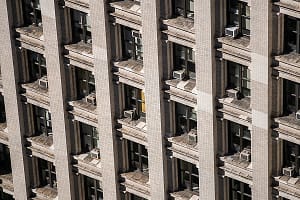Governments across the globe are urging people to avoid close contact with others to slow the spread of coronavirus. Medical experts say “social distancing” will ease the burden on healthcare systems and save lives.
While Hong Kong’s experience with coronavirus since late December shows that social distancing is the best way for countries to protect each other as they collectively fight the virus, the territory shows how social cohesion is equally important. As Hong Kong illustrates, social distancing cannot work alone – to fight the pandemic, people must bridge divides and work together to protect their neighbors as well as themselves.
This odd dichotomy of being apart while joining forces works
As the number of coronavirus cases skyrockets in the Middle East and the West, the disease is largely slowing in Asia. Proximity to mainland China means nothing Singapore, Taiwan and Hong Kong have had enviously small infection numbers, despite being on China’s doorstep.
Europe and the United States are now the epicenters of the pandemic, with more reported cases and deaths than the rest of the world combined.
World Health Organization (WHO) chief Tedros Adhanom Ghebreyesus said on back on 13 March that in Europe, “more cases are now being reported every day than were reported in China at the height of its epidemic.” A month on, and the disorganization and disunity that dominated the Europe’s early stage response is bearing particularly sour fruit.
The same can be said about the United States. Public health officials say the country has reached a tipping point – warning that if Americans don’t take social distancing seriously, the country can expect a scenario worse than Italy’s. Social distancing is critical to help flatten the curve to delay the peak of the outbreak and relieve some of the stress on healthcare systems.
Social distancing is a tool of intervention to stop or slow the spread, and it helps protect the more vulnerable within society. Social distancing means not shaking hands, avoiding crowds and public transportation, standing several feet away from other people and, most importantly, staying home if you feel sick. Business are doing it when they ask employees to work from home or stagger work hours. Governments are doing it when they close schools. We’re seeing it in the sports world, with no-spectator games or the postponement of sporting events. Museums, theaters and concert halls where large groups of people gather are closing their doors.
Hong Kong was one of the first cities to be swept up in the coronavirus crisis after the first cases were reported in China back in November 2019. But the city determined to avoid repeating the nightmare of the 2003 SARS epidemic, which killed 774 people, including 299 in Hong Kong used the hard-won lessons of SARS to combat the new virus. Hong Kong has succeeded in keeping its virus numbers enviously low: 157 confirmed cases and four deaths. In fact, the city has largely kept community-based transmission at bay.
The early and effective response to the outbreak also meant Hong Kong gave itself an earlier opportunity to prepare for economic fallout. As one of the world’s leading financial hubs, the city is home to the world’s leading financial institutions that are key drivers of the global economy. Any prolonging of the virus in Hong Kong would translate to further strain on the global financial systems.
Relics of the SARS outbreak have remained part of daily life in Hong Kong. Many in Hong Kong initially reacted to coronavirus with the same sort of panic that is now sweeping across Europe and the US, buying up everything from surgical masks and antibacterial hand products to rice, noodles and – of course – toilet paper. That panic eased thanks to swift government measures such as self-quarantines, testing, travel restrictions and school closures, and the city’s superb healthcare system. Hong Kong is now “coming back to life” as the worst appears to be over.
“Many companies followed the government’s lead,” Adam Najberg, a Hong Kong-based executive, told Marketwatch. “[Civil] servants, except for critical and health services, worked from home. Buildings and compounds – and individual companies – put [their] own containment and safety measures in place, too. My gym in my compound shut temporarily. The club restaurant delivers, but they stopped dine-in service. I joined another gym temporarily. They have temperature checks in place and scrub every surface religiously after equipment use.”
Despite months of political disunity in Hong Kong before the coronavirus outbreak, an overwhelming social cohesion has now settled across the city. People are working together, at least temporarily casting aside the divisions that wracked the city for months.
With the onset of the virus, Hong Kong’s state-of-the-art medical research sector entered the race for the development of a vaccine for Covid-19. Furthermore, local financial heavyweights have stepped up to the challenge of locally manufacturing surgical masks, encouraged by growing demand and government incentives. These masks are distributed to NGOs who give them to those in need. These examples show Hong Kong at its best – cutting edge science, robust financial sector, and social solidarity which rises above political divisions.
Suppressing the coronavirus has come at a cost to Hong Kong. Schools closed, many businesses paused and all transport to mainland China was suspended. Some people leave their homes only to buy groceries, others refuse to let their children leave the house.
However, the economic effects have been largely contained, after months of wrestling with the Coronavirus, unemployment rose to 3.7% – still roughly half of the EU average. Meanwhile, the government has unveiled an ambitious plan to deal with both the long-term and short-term financial impact, including cash payments to citizens and a boost to the tourism sector. Hong Kong’s large fiscal reserve allows it to cope with this downturn better than most.
But the city, which only a few months ago appeared to be on a downward spiral, is now emerging as an example for the rest of the world on how to manage and beat the virus. While businesses took a hit a few months ago, Hong Kong may be one of the first cities to roar back to life this year.
Najberg said, “SARS led to hygiene and a major upgrade in pandemic preparedness. This is the place to be when you have a health crisis.
“Overall, it has been very orderly. People take this extremely seriously from government on down, and they listen and care about the health and safety of others, not just themselves.”
It is an important lesson from which the world should learn.






Leave a Comment